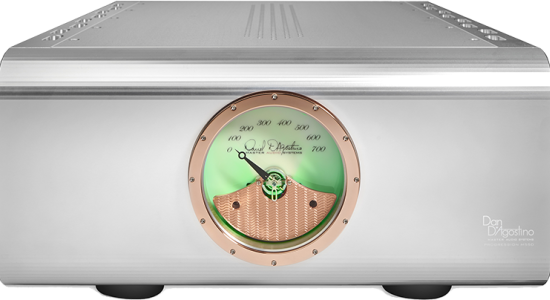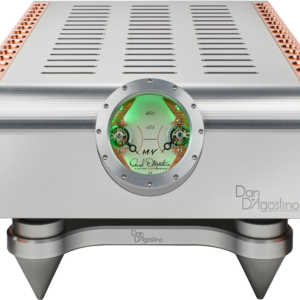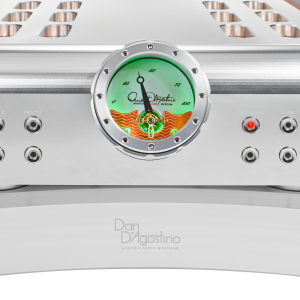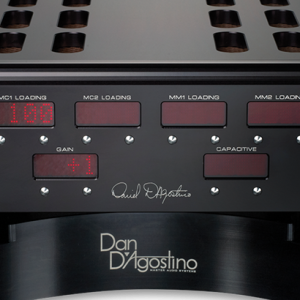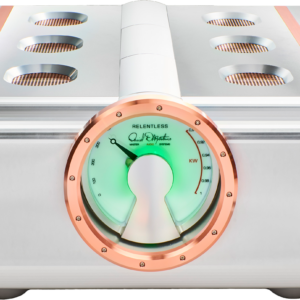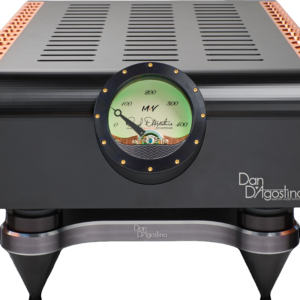High Performance Elevated
There is no mistaking the D’Agostino family styling of the second generation Progression M550 Mono Amplifier. Immediately grabbing one’s attention is the new heat sink design. Drawn directly from the flagship Relentless Mono Amplifier, each heatsink is milled from a single, 48.5-pound (22-kilogram) aluminum billet slab. This highly efficient elliptical form dramatically improves the cooling ability of the design and assures that the Progression M550 Mono Amplifier runs safely and reliably even when delivering its full-rated power. Reflected in the model name, the Progression M550 Mono Amplifier delivers 550/1,100/2,220 watts into 8/4/2 ohms.
The Progression M550 includes major revisions to the input topology. Distortion, signal/noise ratio, channel separation, and bandwidth measurements have all improved. New transistors handle six times the power of the previous components and a new DC coupling circuity has improved low frequency performance and extended the bandwidth of the amplifiers. Pairing this advanced front end to the enhanced output stage has improved the dynamic impact, detail retrieval, and spatial integrity of the amplifier’s playback. The audio signal path throughout is discrete, balanced, and direct coupled. Advanced protection techniques shield the amplifier and associated components from any unexpected anomaly.
Exploring New Dimensions
A new power device provides the foundation for an upgraded output stage. This new transistor, first used in the Relentless Mono Amplifier, extends high frequency response, increases power handling by a factor of four and features tighter tolerance gain matching between complementary NPN/PNP pairs. A wider safe operating area and superior gain linearity provides greater thermal stability throughout the amplifiers’ power delivery. Coupling the new output device to the high efficiency heat sink design affords an increase in operating bias. The higher bias specification has increased the Class A operating range of the Progression M550 to 70 watts. The result is improved instrument timbre and tonal reproduction for a great percentage of listening.
Maintained from the original amplifier is the Super Rail topology, a simple concept but complex in execution. Every amplifier employs a voltage rail, actually two, a positive one and its companion negative partner. Voltage rails support the delivery of power to the speaker. The music signal swings between these two rails but due to natural loss, the musical signal never reaches the output rails’ full capability. A Super Rail overcomes this limitation. Borrowing the idea of a turbo in a car engine, the Super Rail employs higher voltage rails in the sections prior to the output stage. This voltage “boost” allows the musical signal to exploit the full capability of the output voltage rails. Extending the musical signal swing closer to the output rails maximizes the performance of the output circuitry design itself. Nearly ideal output stage operation results with improved dynamics, lower distortion, and a fierce grip of the speaker. The output topology employs 48 power transistors anchored by a 2,000 VA power supply transformer and nearly 100,000 microfarads of power supply storage capacitance.
Legendary Purity
The anodized Aluminum faceplate includes the iconic look of the company’s power meters. The Progression M550 Mono Amplifier 180° meter needle is driven by a high-speed ballistic circuit improving the meter’s responsiveness. The longer needle arc covers the amplifier’s entire output range.
With innovative circuitry and virtually unlimited power output, the Progression M550 Mono Amplifiers deliver intimate musical details, three-dimensional sound staging, and startling dynamics not possible from less capable designs.
Specs
Frequency Response 1 Hz to 80 kHz, -1 dB / 20Hz to 20 kHz, ±0.01 dB
Signal-to-Noise Ratio 105 dB – unweighted / 75 dB – A weighted
Finish Silver or Black with Custom Finishes Available Upon Request
Input Impedance 100 KΩ
Output Impedance 0.1Ω
Power 550 watts @ 8Ω 1,100 watts @ 4Ω 2,200 watts @ 2Ω
Distortion 550W @ 8Ω .015% @ 1 kHz
Inputs 1 balanced XLR
Dimensions 17.875 x 9.0 x 23.0 in / 45.4 x 23.0 x 58.4 cm
Weight 115 lb / 52.2 kg

